11-day Tanzania Volunteer Trip
A Safari like no other!
Travel on ConservationVIP’s Tanzania Volunteer Trip to immerse yourself in Tanzania’s wildlife and other natural wonders. Volunteer on reforestation projects near Lake Manyara National Park – part of the Great Rift Valley Escarpment – and in the Rau Forest Reserve in Moshi Town at the foot of Mt. Kilimanjaro. Northern Tanzania is best known for its wildlife safaris.
Tanzania is vibrant in cultural diversity, world-renowned for wide-open savannahs, lush tropical mountain forests, the Great Rift Valley and Mt. Kilimanjaro. With abundant natural resources, it is home to three UNESCO World Heritage sites. Gain an appreciation for the people, their cultural heritage, and the highland and forest environments they call home while also helping to preserve and restore this incredible ecosystem and landscape.
Conservation Activities | Itinerary | Price | Trip Reviews | Prior Trip Reports | Safety
Conservation Activities
Environmental issues
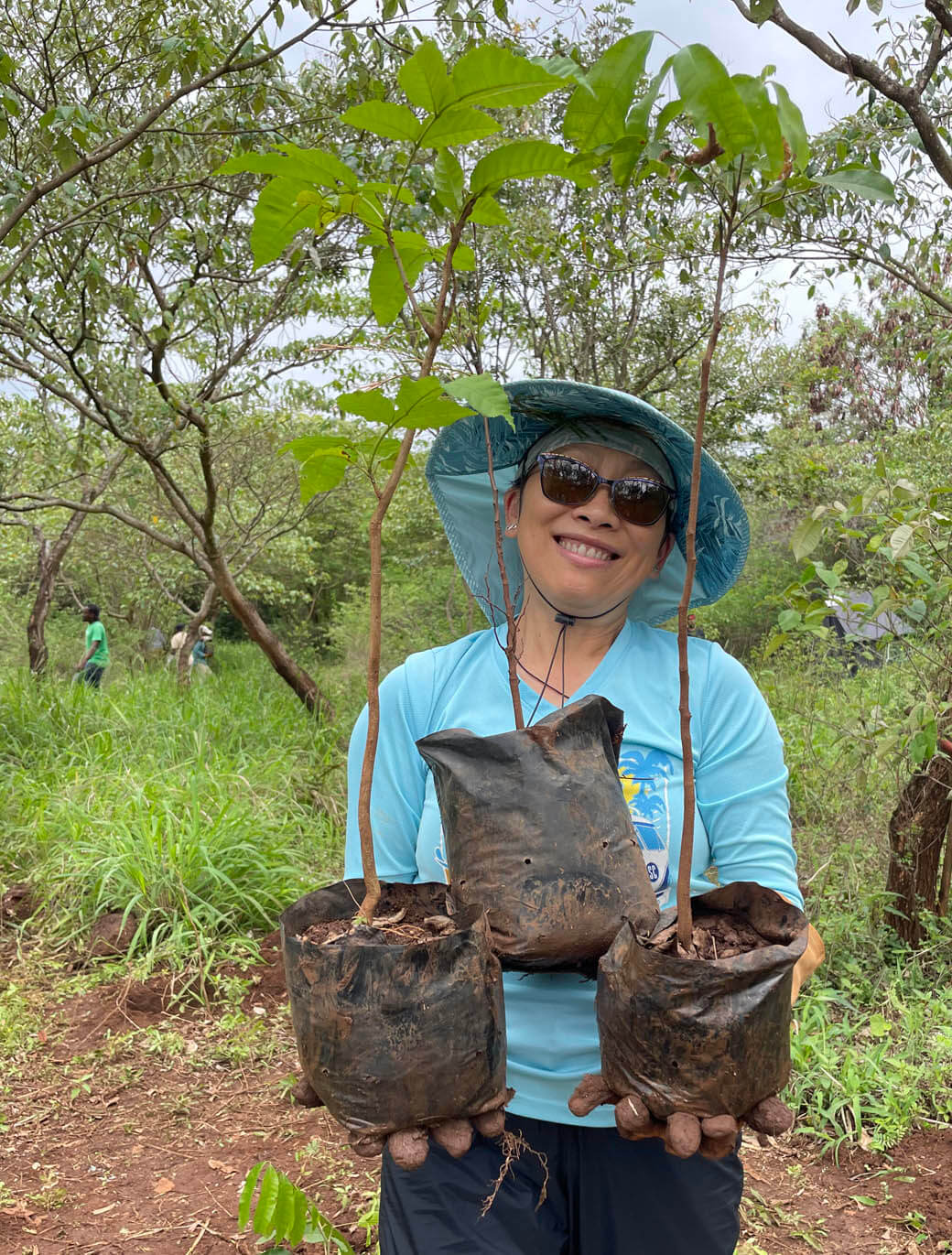 Desertification is one of Tanzania’s biggest challenges due to climate change and deforestation caused by population growth. Our Tanzania conservation projects focus on reforestation and trail restoration in the highlands of the Great Rift Valley and at the foot of Mount Kilimanjaro in the northern part of Tanzania.
Desertification is one of Tanzania’s biggest challenges due to climate change and deforestation caused by population growth. Our Tanzania conservation projects focus on reforestation and trail restoration in the highlands of the Great Rift Valley and at the foot of Mount Kilimanjaro in the northern part of Tanzania.
How We Help
Our volunteer projects support the development of a sustainable environment for future generations. The trees we plant will help protect water sources, improve water quality, and reduce erosion. Providing shelter for wildlife, the trees promote biodiversity. Reforestation also provides space for the local community’s well-being.
The project activities include planting indigenous trees, growing rare trees in a nursery, collecting seeds, and carrying out essential surveys to monitor forest regeneration. We may also build a fence to protect and preserve natural resource land and remove non-native species. In addition, we will help restore trails in the Rau Forest Reserve and learn about local forest restoration from an expert land manager.
Community Collaboration
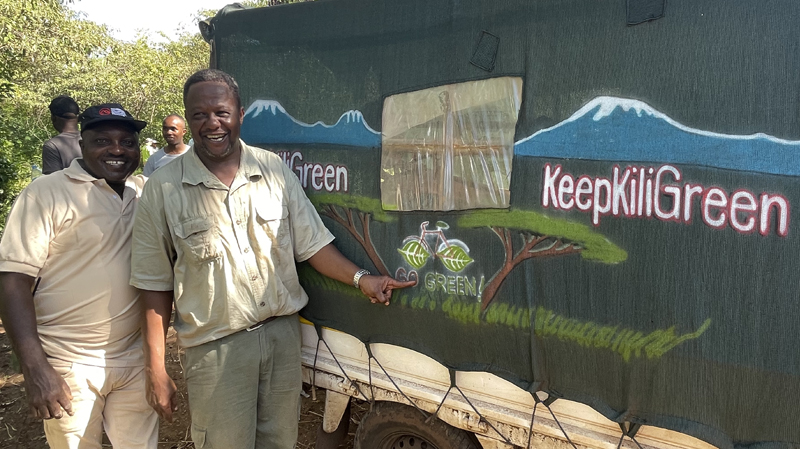 TheTanzania Volunteer trip offers the opportunity to experience Tanzania in a unique way not available to the average safari tourist. Throughout the trip we collaborate with local community organizations.
TheTanzania Volunteer trip offers the opportunity to experience Tanzania in a unique way not available to the average safari tourist. Throughout the trip we collaborate with local community organizations.
Is this Trip Right for You?
No prior experience is required! We will provide project training. You should be able to hike with a day pack, climb hills, move soil or rock with a shovel, pull unwanted vegetation, or carry stones. As always, our priority is your health and safety.
Itinerary | Price | Trip Reviews | Prior Trip Reports | Safety
Tanzania Volunteer Trip Itinerary
Day 1: “Karibu Tanzania Rafiki” Introductions & Orientation
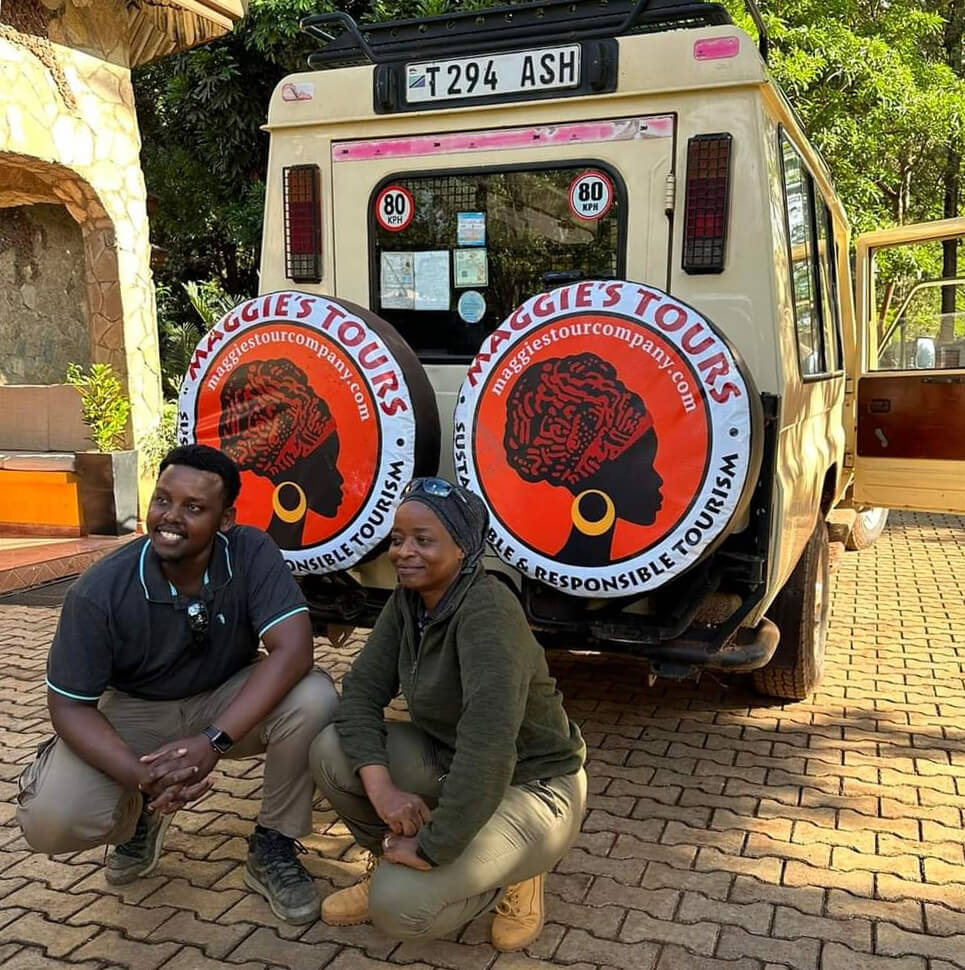 Welcome to Tanzania, friend! Our volunteer trip begins at 4:30 p.m. at our lodge in Arusha. We will have an orientation meeting where you will meet your ConservationVIP® Trip Leaders, fellow volunteers, and local guide from Maggie’s Tours and get an overview of the exciting time ahead, including the history of Tanzania and its people after British Colonialism, thru independence to modern times. We will have an introductory lesson to the languages of Swahili and Iraqw (a Cushitic language) for an engaging exchange!
Welcome to Tanzania, friend! Our volunteer trip begins at 4:30 p.m. at our lodge in Arusha. We will have an orientation meeting where you will meet your ConservationVIP® Trip Leaders, fellow volunteers, and local guide from Maggie’s Tours and get an overview of the exciting time ahead, including the history of Tanzania and its people after British Colonialism, thru independence to modern times. We will have an introductory lesson to the languages of Swahili and Iraqw (a Cushitic language) for an engaging exchange!
Day 2: Drive to Karatu and Gekrum Village. Keep an eye out for wildlife along the way!
 After breakfast, we depart the lodge for the 2 ½ hour drive to our lodge in Karatu, with rest stops along the way. After checking into our lodging, we will make the 30-minute drive to our project site at Gekrum Village, which borders Lake Manyara National Park. Here we will be met by Gekrum Village members, a Cushitic community near our project site, with whom we will be working. We will enjoy a community welcome lunch, orientation and volunteer project overview.
After breakfast, we depart the lodge for the 2 ½ hour drive to our lodge in Karatu, with rest stops along the way. After checking into our lodging, we will make the 30-minute drive to our project site at Gekrum Village, which borders Lake Manyara National Park. Here we will be met by Gekrum Village members, a Cushitic community near our project site, with whom we will be working. We will enjoy a community welcome lunch, orientation and volunteer project overview.
Then we will begin preparations for our reforestation project. After our initial work is complete, we will return to the lodge for dinner.
Day 3: Reforestation Project with the Gekrum Community
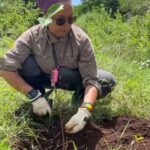 We depart the lodge after breakfast for the project site, a short drive away at Gekrum Village. Our projects will vary throughout the week and may include removing non-native species, preparing the soil for planting, planting native plants, collecting water and watering, and mixing fertilizer. This may involve hiking 1 – 3 miles round trip per day. After our projects end for the day, generally around 4:30 p.m., you will have a little time to relax before dinner.
We depart the lodge after breakfast for the project site, a short drive away at Gekrum Village. Our projects will vary throughout the week and may include removing non-native species, preparing the soil for planting, planting native plants, collecting water and watering, and mixing fertilizer. This may involve hiking 1 – 3 miles round trip per day. After our projects end for the day, generally around 4:30 p.m., you will have a little time to relax before dinner.
Day 4: Rest Day – Lake Manyara National Park
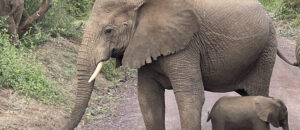
Today is a rest day. You can rest and relax on your own, enjoying the hotel grounds, or you can explore Lake Manyara National Park on safari. Our volunteer project helps to create a natural buffer zone between the village and Lake Manyara National Park which abuts Gekrum Village.
The safari to Lake Manyara National Park offers you the opportunity to see how our volunteer project in Gekrum helps to conserve The Great Rift Valley. Within its numerous microclimates, Lake Manyara National Park encloses a diverse range of landscapes and animal populations which mirror those of many different parts of Tanzania. We will enjoy lunch in the park. Later we return to the lodge to freshen up before dinner
Day 5: Reforestation Project Work with the Gekrum Community
Today, we return to the project site for tree planting work and have a celebration with our Gekrum Community Partners before saying goodbye. We return to the lodge for dinner.
Day 6: “Kwaheri Karatu, Habari Moshi” (Goodbye Karatu, Hello Moshi)
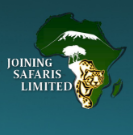 After an early breakfast, there will be an introduction to the next partner on our journey and a briefing on our upcoming activities at the foot of Mount Kilimanjaro! Then, we will depart the lodge for the day-long journey northeast to the foothills of Mt. Kilimanjaro and our next project site. We will stop along the way for lunch and refreshments, then continue to our hotel in Moshi.
After an early breakfast, there will be an introduction to the next partner on our journey and a briefing on our upcoming activities at the foot of Mount Kilimanjaro! Then, we will depart the lodge for the day-long journey northeast to the foothills of Mt. Kilimanjaro and our next project site. We will stop along the way for lunch and refreshments, then continue to our hotel in Moshi.
Days 7-9: Moshi and Rau Forest Reserve Reforestation and Trail Maintenance.
We begin our Rau Forest Reserve project with an expert land manager’s orientation about the Rau Forest Reserve, including visiting the community adjacent to the forest and learning about the local culture.
During our time at Rau Forest Reserve, we will engage in a variety of activities including planting indigenous trees, preparing the tree planting site, working in the tree nursery, forest trail clean-up, and maintaining trails.
The projects may involve hiking 1- 3 miles per day. After our projects end for the day, generally around 4:30 p.m., we return to the lodge before dinner. After dinner is your free time to relax and unwind.
Day 10: Kiviwama Day & Celebration Dinner
Today we head back to the Rau Forest Reserve and meet up with our partners from Kiviwama, who will lead us in planting trees in the Njoro Juu Water Spring’s natural springs. Kiviwama (Young Activists in Environment affiliate in Moshi) was formed in 1999 during the national water week when the nation motivated the citizens to plant and care for these indigenous trees that are water friendly. After our work is complete, we return to the hotel to refresh and relax before dinner.
Before we say goodbye to our Rafiki (friends) in Tanzania, we will come together for a meal to celebrate our work together.
Day 11: Kwaheri Rafiki! Day of Departure.
Our trip ends after breakfast. You may join the transfer to Kilimanjaro International Airport or opt to extend your stay in Tanzania with a safari in one of the many national parks and reserves.
IMPORTANT NOTES about the Itinerary:
- Most importantly, you should plan to arrive at the meeting point for the trip on time on Day 1. This may require departing your hometown one or more days in advance and traveling on an overnight flight.
- Second, before purchasing your airline tickets, please check with us to ensure the trip has the necessary minimum number of travelers required to operate.
- Finally, while we do our very best to adhere to the itinerary above, it is subject to change for reasons beyond our control, including changes in the local project needs, weather, and terrain conditions.
Tanzania Volunteer Trip Price
US$5,330 for 11 days: single supplement is an additional US$300 (subject to availability)
(Note: Your trip expense may be tax-deductible. Please see our Frequently Asked Questions page and consult your tax advisor for details.)
Price includes:
- ConservationVIP’s Trip Leadership and support staff for volunteer activities
- Local Guides
- All meals from dinner on Day 1 through breakfast on the final
- Hotel accommodations
- All transportation as noted on the itinerary
- Project tools and supplies, including purchase of trees and planting supplies
- All orientation and training as noted on the itinerary
- Park entrance fees
Price does not include:
- International airfare to/from Tanzania
- Visa fees
- Breakfast or Lunch on Day 1
- Meals after breakfast on the day of departure
- Medical immunizations
- Insurance (emergency medical and evacuation insurance is mandatory)
- Excess baggage charges
- Airport taxes
- Snacks not noted in the itinerary
- Alcoholic beverages or soft drinks
- Personal items
Deposit and Cancellation
A deposit of $800 per person for a shared room ($900 for a single room) is required at the time of signup; final payment is due at 90 days prior to departure. The payment and refund policy can be found here.
Group Size: 8-10 plus trip leaders
Tanzania Volunteer Trip Reviews
Submit your review | |
Have you ever dreamed about a wonderful vacation with a purpose? We experienced a beautiful culture, great food, amazing scenery and animals. The food was perfect, the accommodations comfortable and the people felt like family. We worked, we played, we experienced and we were fulfilled.
The opportunity to work closely with local individuals who care about their world was particularly rewarding. The hard work and commitment of local people was inspiring and I was touched by the gratitude displayed for the small contribution we made. I am impressed with the work that Maggie from Maggie's Tours is doing with local villagers near Gekrom (sp?) out of Arusha. The young women she is mentoring will benefit from her gentle guidance and leadership. I would recommend persons interested in a trip to Tanzania to consider this CVIP opportunity.
Great camaraderie developed quickly amongst a small group of like-minded individuals. The projects provided a great opportunity to work side by side with our Tanzanian partners and to observe and participate in cultural exchanges that typical tourist trips don't allow. The tree planting and trail clearing were physically demanding but not excessively so. While many of the volunteers felt we could have done more, it was gratifying to observe how appreciative our hosts were. The project location was very well situated to allow for independent safari travel preceding or following the volunteer trip. The weather was more comfortable than anticipated in terms of temperature, humidity, and rainfall, and there were surprisingly few bothersome insects. All in all this was an excellent first-for-the-region trip.
This was definitely a trip of a lifetime for us. We were able to give back to a community that was dedicated in addressing deforestation and climate change. The village members were so appreciative of Conservation VIP volunteers who were there to help them and showed their appreciation with a celebration on our last day with them. So thoughtful of them to do so. We planted a lot of trees between the village and at the RAU National Forest, including the unique Baobob tree. For the inaugural trip to Tanzania we felt everything was run smoothly for us volunteers. We are looking forward to future trips with Conservation VIP.
Gear List for Tanzania Volunteer Trip
The key to staying comfortable while on an active trip like ConservationVIP’s Tanzania Volunteer Trip is layering. To get maximum comfort with minimum weight, you need versatile layers that mix and match to create the right amount of insulation, ventilation, and weather protection. The Tanzania Volunteer Trip gear list has been created to help you in choosing your equipment for the trip. View the Tanzania Gear List pdf.
Tanzania Volunteer Trip Reports
Please click the link below to read trip reports.
Safety is our priority
ConservationVIP has always focused on our volunteers’ safety. Traveling with safety concerns requires some extra planning and flexibility both for trip leaders and trip participants!
Match Your Abilities with the Trip
To safely enjoy the trip, choose a trip which suits your abilities. For this trip you should be able to hike with a day pack, climb hills, move soil or rock with a shovel, pull unwanted vegetation, or carry stones.
Follow Trip Leader’s Instructions
In addition, to prevent injury or illness on the trip, travelers will need to follow the trip leader’s instructions. Site-specific procedures and other safety instructions will be provided on the trip.
Medical Advice
Please check with your doctor to see if any immunizations are recommended for you.
Comply with other Travel Restrictions
Finally, you will also have to comply with any restrictions imposed by Tanzania and your country of origin at the time of travel. While we know that the restrictions may change between now and the time of travel, we cannot predict what those changes will be.
